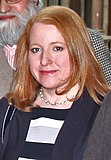The Liberal Democrats (commonly referred to as the Lib Dems) are a liberal[10] political party in the United Kingdom. The party has 13 Members of Parliament in the House of Commons, 84 members of the House of Lords, four Members of the Scottish Parliament, one member in the Welsh Senedd and two members in the London Assembly. The party served as the junior party in a coalition government with the Conservative Party between 2010–2015, with Scottish Labour in the Scottish Executive from 1999 to 2007, and with Welsh Labour in the Welsh Government from 2000 to 2003 and from 2016 to 2021.

| |||||||||||||||||||||||||||||||||||||||||||||||||||||||||||||||||||||||||||||||||||||||||||||
All 650 seats in the House of Commons 326[n 1] seats needed for a majority | |||||||||||||||||||||||||||||||||||||||||||||||||||||||||||||||||||||||||||||||||||||||||||||
|---|---|---|---|---|---|---|---|---|---|---|---|---|---|---|---|---|---|---|---|---|---|---|---|---|---|---|---|---|---|---|---|---|---|---|---|---|---|---|---|---|---|---|---|---|---|---|---|---|---|---|---|---|---|---|---|---|---|---|---|---|---|---|---|---|---|---|---|---|---|---|---|---|---|---|---|---|---|---|---|---|---|---|---|---|---|---|---|---|---|---|---|---|---|
| Opinion polls | |||||||||||||||||||||||||||||||||||||||||||||||||||||||||||||||||||||||||||||||||||||||||||||
| Registered | 47,568,611 | ||||||||||||||||||||||||||||||||||||||||||||||||||||||||||||||||||||||||||||||||||||||||||||
| Turnout | 67.3% ( | ||||||||||||||||||||||||||||||||||||||||||||||||||||||||||||||||||||||||||||||||||||||||||||
| |||||||||||||||||||||||||||||||||||||||||||||||||||||||||||||||||||||||||||||||||||||||||||||
- ^ Norman, Paul (21 June 2021). "Liberal Democrats Relocate Westminster HQ". CoStar.
{{cite web}}: CS1 maint: url-status (link) - ^ "The Liberal Democrats Annual Report". Electoral Commission.
- ^ "Style guide". Liberal Democrats.
- ^ "State of the parties - MPS and Lords - UK Parliament".
- ^ "Lords by party, type of peerage and gender". Parliament.uk. Archived from the original on 12 June 2015. Retrieved 13 June 2015.
- ^ "Assembly Members". London City Hall.
- ^ "Current party balance". Scottish Parliament Website.
- ^ "Your Members of the Senedd".
- ^ "Local Council Political Compositions". Open Council Data UK. 8 July 2020. Archived from the original on 30 September 2017. Retrieved 8 July 2020.
- ^ Nordsieck, Wolfram (2017). "United Kingdom". Parties and Elections in Europe. Retrieved 3 May 2018.
- ^ "StackPath". Institute for Government. 20 December 2019.
- ^ "Results of the 2019 General Election". BBC News. Retrieved 14 December 2019.
- ^ Given that Sinn Féin MPs do not take their seats and the Speaker and deputies do not vote, the number of MPs needed for a majority is, in practice, slightly lower.[11] Sinn Féin won 7 seats, meaning a practical majority requires 322 MPs.
- ^ Nicola Sturgeon sits as an MSP in the Scottish Parliament for Glasgow Southside. Ian Blackford, MP for Ross, Skye and Lochaber, is the SNP leader at Westminster.
- ^ Includes Neale Hanvey, who was suspended from the party at the time of his election and thus took his seat as an independent.
- ^ An MEP for Northern Ireland.
Cite error: There are <ref group=nb> tags on this page, but the references will not show without a {{reflist|group=nb}} template (see the help page).






